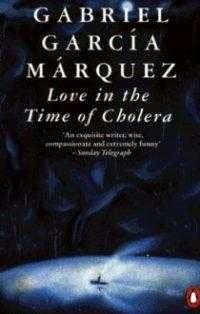The Motorcycle Diaries - Ernesto "Che" Guevara

"Words are the voice of the heart." - Confucius. This place is for me, and you, to revel in the art of the written word. So pull up that hot pot of tea, coffee, or mulled cider, a comfy chair, a good book, and maybe a cat or two and join my bibliophilia!

Scribed by
Nyssaneala
at
11:42 AM
4
reader's responses
![]()
Labels: expanding horizons challenge, non-fiction, reading across borders, south american lit, world lit
 Title: Love in the Time of Cholera
Title: Love in the Time of Cholera
Author: Gabriel García Márquez, translated by Edith Grossman
Country: Colombia
Year: 1985
Rating: A-
Pages: 348
There are already some great reviews of this book out there: Eva at A Striped Armchair, Tanabata at In Spring it is the Dawn, Nymeth at Things Mean A Lot, and Chris at Book-A-Rama have all read Love in the Time of Cholera this year.
First sentence: It was inevitable: the scent of bitter almonds always reminded him of the fate of unrequited love.
Challenge book? I read this for the Book Awards Challenge and 2nds Challenge. It was on my list for the Expanding Your Horizons Challenge, but that doesn't start until January so I'm not going to count it.
Short summary: How long would you wait for love? Florentino Ariza is preared to wait 51 years, 9 months, and 4 days. Love in the Time of Cholera is above all a love story set in the late 19th and early 20th century; a story about all the different ways that people can love each other.
What I thought: This novel is in a style completely different from One Hundred Years of Solitude (I would not classify it as a "magical realism" novel), but it retains the lyrical, passionate, and evocative prose that Marquez is so well known for. It is a love story, but it is not only a love story--more of an in-depth look at love and obsession, and how it can change and evolve over a lifetime.
I always love the imagery in many South American novels, and Marquez is one of the masters. I would definitely recommend this book to anyone who likes magical realism, thoughtful prose, and strong character development. It is a book that demands your attention - if you don't have the time to immerse yourself, hold on to it for another day.
Interesting tidbit: In Spanish, el cólera means cholera, but la cólera means choler or anger. If you take this to the extreme, it can be used to describe warfare. In the novel, victims of the civil war are often mistaken for victims of cholera.
From the sky they could see, just as God saw them, the ruins of the very old and heroic city of Cartagene de Indias, the most beautiful in the world, abandoned by its inhabitants because of the cholera panic after three centuries of resistance to the sieges of the English and the atrocities of the buccaneers.
Someone said that cholera was ravaging the villages of the Great Swamp. Dr. Urbino, as he spoke, continued to look through the spyglass.
"Well, it must be a very special form of cholera," he said, "because every single corpse has received the coup de grace through the back of the neck."
-p.226
Scribed by
Nyssaneala
at
8:25 AM
8
reader's responses
![]()
Labels: book awards challenge, colombian lit, fiction, literature, nobel prize, seconds challenge, south american lit, world lit